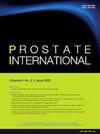Sex hormones, blood metabolites and proteins mediating the causal associations between gut microbiota and prostatic diseases: evidences from Mendelian randomization study
IF 2.6
2区 医学
Q2 UROLOGY & NEPHROLOGY
引用次数: 0
Abstract
Background
The causal relationships between the gut microbiota and prostate cancer, prostatitis, and benign prostatic hyperplasia remain uncertain. We intend to identify the causal connections between the gut microbiota and prostatic diseases and investigate the potential mechanisms involved.
Methods
A two-sample Mendelian randomization (MR) analysis was conducted to elucidate the impact of 196 gut microbiota on prostatic diseases risk. Reverse MR, linkage disequilibrium regression score (LDSC), and colocalization analyses were performed to strengthen causal evidence. Phenome-wide MR (Phe-MR) analysis was used to evaluate the potential side effects of targeting the detected gut microbiota. We designed a two-step MR study to assess the mediating effects of sex hormones, blood metabolites, and proteins.
Results
According to the MR analyses, 31 bacterial taxa were causally associated with prostatic diseases, of which 23 types were newly identified. In addition, Alphaproteobacteria restrained prostate cancer, Ruminococcaceae UCG009 prevented prostatitis, and Clostridiales posed a risk for benign prostatic hyperplasia. LDSC and colocalization analyses indicated that the detected associations were not confounded by genetic correlation or LD from common causal loci. In the mediation analysis, we identified 53 mediators linking the gut microbiota to prostatic diseases, with a specific emphasis on the critical roles played by sex hormones and blood metabolites, and identified 34 proteins that may be used as therapeutic targets, especially FGFR1 and XPNPEP1.
Conclusions
Our study represents the first comprehensive exploration of the causal effects of the gut microbiota on prostatic diseases and reveals the mediating effects of sex hormones and blood metabolites on the “gut-prostate axis.”
性激素、血液代谢物和蛋白质介导肠道微生物群与前列腺疾病之间的因果关系:来自孟德尔随机研究的证据
背景:肠道菌群与前列腺癌、前列腺炎和良性前列腺增生之间的因果关系尚不清楚。我们打算确定肠道微生物群和前列腺疾病之间的因果关系,并研究可能涉及的机制。方法采用双样本孟德尔随机化(MR)分析,探讨196种肠道菌群对前列腺疾病风险的影响。反向磁共振、连锁不平衡回归评分(LDSC)和共定位分析来加强因果证据。使用全现象MR (Phe-MR)分析来评估针对检测到的肠道微生物群的潜在副作用。我们设计了一项两步磁共振研究来评估性激素、血液代谢物和蛋白质的中介作用。结果31个细菌类群与前列腺疾病相关,其中新发现23个。此外,Alphaproteobacteria抑制前列腺癌,Ruminococcaceae UCG009预防前列腺炎,Clostridiales具有良性前列腺增生的风险。LDSC和共定位分析表明,检测到的关联不会被遗传相关或来自共同因果位点的LD混淆。在中介分析中,我们确定了53种将肠道微生物群与前列腺疾病联系起来的介质,特别强调性激素和血液代谢物所起的关键作用,并确定了34种可能用作治疗靶点的蛋白,特别是FGFR1和XPNPEP1。结论sour研究首次全面探讨了肠道菌群与前列腺疾病的因果关系,揭示了性激素和血液代谢物在“肠-前列腺轴”中的中介作用。
本文章由计算机程序翻译,如有差异,请以英文原文为准。
求助全文
约1分钟内获得全文
求助全文
来源期刊

Prostate International
Medicine-Urology
CiteScore
4.40
自引率
26.70%
发文量
40
审稿时长
35 days
期刊介绍:
Prostate International (Prostate Int, PI), the official English-language journal of Asian Pacific Prostate Society (APPS), is an international peer-reviewed academic journal dedicated to basic and clinical studies on prostate cancer, benign prostatic hyperplasia, prostatitis, and ...
 求助内容:
求助内容: 应助结果提醒方式:
应助结果提醒方式:


